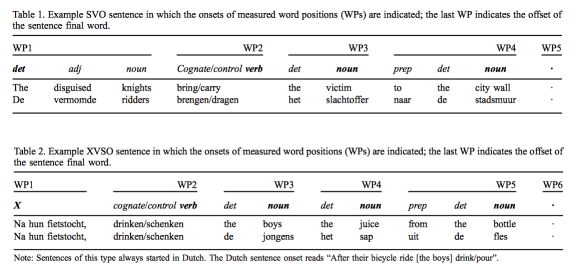Costs of Language Switching in Bilingual Sentence Processing
| ✅ Paper Type: Free Essay | ✅ Subject: Linguistics |
| ✅ Wordcount: 766 words | ✅ Published: 12 Sep 2017 |
Switch cost modulations in bilingual sentence processing: evidence from shadowing
INTRODUCTION
This study aims to determine the cognitive costs of language switching in bilingual sentence processing. It also wants to investigate whether the cognitive cost is different depending on whether the switch is from L1 to L2 or vice versa. Many studies have shown that there is a significant cognitive cost to switching languages, including slower reaction times and more errors (Monsell 2003). Through tests involving shadowing tasks, cognates are used to see if there is a decrease in cognitive cost due to the activation of networks from both languages. Previous studies on bilingual subjects have already shown that code switching is more frequent in cases where cognates are present; therefore it is hypothesized that due to the overlap of lexical representations, cognates not only increase frequency but also facilitate the switch. The amount of cognitive cost could also depend on which direction the switch is occurring. Data from previous studies has shown that the switch from L1 to L2 is more demanding than that of L2 to L1 (Proverbio, 2004). This is due to the idea that proficiency in a language plays a role in the ease of processing L2; the stronger the mental representation of a word is, the more cognate facilitation occurs.
METHODS
The study included fifty bilingual participants aged 18-41, all of which were Dutch natives who also spoke English as a second language. All were highly proficient in English having learned it early on in school and often taking university courses in English.
The stimulus material included forty different sentences. The sentences vary in language (Dutch or English), sentence structure (SVO, XVSO, or VSO) as well as the presence of a cognate (Non-cognate vs. cognate). If a cognate verb occurred, a language switch often followed it. Sample sentences are presented in Table 1 and 2.
Participants were tested alone in a sound proof room with a computer and headphones. They were instructed to listen to sentences in which a Dutch-English language switch would occur and start shadowing it as soon as they started hearing syllables. Correct repetition of the phrases was stressed. Researchers were in the other room monitoring the performance. Between each set, instructions in either Dutch or English were presented to cue the following language. After the experiment, they then performed the Simon task and the Operation Span task in order to asses their cognitive abilities as well as another test to test their proficiency in the English language.

DISCUSSION
The results demonstrated that there is a definite cost of switching language, regardless of the direction; however, the switch from L1 to L2 is more costly. This is most likely due to language dominance and the switch cost could just be attributed to the fact that the baseline for L1 is already quicker than L2. There was also a language effect demonstrated; shadowing in L2 was slower and more prone to errors than L1. However, this effect is not due to proficiency in L2 as the data showed that language proficiency was only significant in the onset of the sentence. Contrary to the hypothesis, there was not an effect of cognate presence, no matter the language or sentence structure. Previous studies suggest that this is because the facilitated processing that typically occurs is with noun cognates, not verbs. The lack of facilitation is in line with many previous studies of verb cognate effects in sentences. In some cases, there was more switch cost when a verb cognate was present. It is possible that no coactivation of both languages occurred because the participant suppressed one, making it harder to retrieve in a switch. Additionally, the auditory effects of repeating the sentences out loud may have contributed to the lack of effects. The phonological effect of shadowing may also contribute to increased costs in language switching; not only does the subject have to switch their lexical representations, they also have to change the manner of articulation (Phillip & Koch, 2011) In general, this study has shown that there are no modulation effects of verb cognates in sentence context. It does however show the effects of bilingualism in switch cost. If language is asymmetrical and one language is stronger than the other, switch costs are higher for the less proficient language while the more dominant language is processed with more ease. These results are not new findings, however they provide additional support for previous studies on verb cognates as well as language dominance.
REFERENCES
Bultena, S., Dijkstra, T., & van Hell, J.G. (2015) Switch cost modulations in bilingual sentence processing: evidence from shadowing, Language, Cognition and Neuroscience, 30(5), 586-605, doi: 10.1080/23273798.2014.964268
Cite This Work
To export a reference to this article please select a referencing stye below:
Related Services
View allDMCA / Removal Request
If you are the original writer of this essay and no longer wish to have your work published on UKEssays.com then please click the following link to email our support team:
Request essay removal



